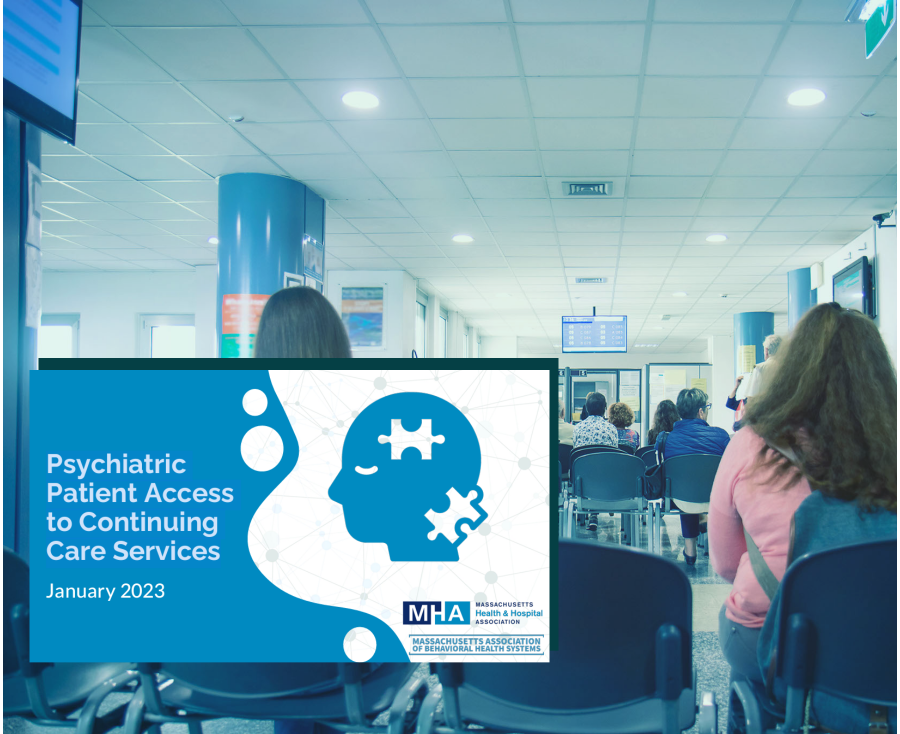Psychiatric Patient Access to Continuing Care Services

Results of a recent survey from the Massachusetts Health & Hospital Association (MHA) and the Massachusetts Association of Behavioral Health Systems (MABHS) show that hundreds of patients are unable to access Department of Mental Health (DMH) services and are therefore “stuck” in hospital inpatient psychiatric units and freestanding psychiatric facilities.
The situation, driven by workforce and bed shortages, represents how capacity pressures are reverberating through hospitals and every component of the healthcare system. The MHA/MABHS report is intended to inform the ongoing collaboration between the provider community and the state to address the issue.
View the Report:
Some patients with severe psychiatric conditions who require DMH “continuing care” services have been waiting for more than a year for specialized care. Continuing care services are for those who “present serious psychiatric symptoms requiring extended hospital stays with levels of care beyond an acute care hospital.” Because psychiatric units are unable to transfer patients ready for discharge into DMH continuing care beds, the psychiatric units themselves are unable to accept new patients into the inpatient psychiatric beds. This, in turn, contributes to “behavioral health boarding” in hospital emergency departments and other units.
MHA and MABHS surveyed acute care hospitals with inpatient psychiatric units and freestanding psychiatric facilities twice – in December 2021 and November 2022. In November 2022, 322 patients were awaiting discharge from the psychiatric units. Of those, 266 were awaiting DMH services, and of the 266, 110 were awaiting DMH continuing care services. Of the 110 patients, 24 had been waiting for a DMH continuing care bed for more than a year.
The average length of stay while awaiting transfer to a continuing care bed is 197 days – an increase from 161 days in 2021.
Over the past 15 years, the total number of DMH continuing care beds across the state has dropped from 829 to 663, further challenging the ability to place patients. (The 663 includes 30 continuing care beds that were replaced in 2022 after needed infection control measures earlier in the pandemic took the beds offline.)
By statute, DMH must give “forensic” cases priority for its 660-plus continuing care beds. Since December 2021, when DMH was first mandated to report regularly on the availability of continuing care beds, 1,024 admissions to the beds were for forensic cases and only 43 were admissions from psychiatric units in hospitals or freestanding psychiatric facilities.
“We are seeing a ripple effect of backups throughout the entire healthcare system,” said Leigh Simons Youmans, MHA’s senior director of Healthcare Policy, who has been coordinating with MABHS, the state, the legislature, and advocates to help resolve the issue. “DMH is experiencing the same workforce and capacity problems as other providers, and we believe there are some solutions that can help alleviate these challenges.”
One of the primary solutions involves expanding the number of continuing care beds. In late December, DMH released a Request for Responses, seeking a qualified inpatient psychiatric hospital(s) to provide 65 continuing care inpatient level beds for civil admissions. The 65 continuing care beds may be all within one hospital or may be split across two hospitals, provided that the beds are on units dedicated exclusively to the state contract and that the minimum capacity for any single hospital is 30 beds.
In the longer-term, MHA and MABHS say that more community-based and “wrap-around” services will be needed so that DMH-run facilities can safely discharge patients and accept patients from inpatient units more rapidly.
“The fragility of the state’s behavioral health system means that the inability to place a few hundred patients translates into hundreds of additional behavioral patients boarding regularly in acute care hospitals as they await an inpatient bed,” Youmans said. “We are committed to being an active part of the solution and commend the Department of Mental Health and the legislature for laying the groundwork to add additional continuing care beds to the behavioral health continuum.”

 Massachusetts Health & Hospital Association
Massachusetts Health & Hospital Association